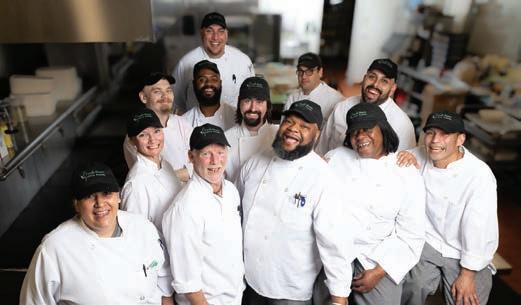
5 minute read
Catalyst Kitchens and Workforce Development
from National Culinary Review (September/October 2024)
by National Culinary Review (an American Culinary Federation publication)
By Amelia Levin, NCR Editor
With culinary school prices continuing to rise, aspiring chefs unable to afford traditional schooling are turning to both apprenticeship programs, which are growing across the country, and workforce development programs offering culinary training.
“Many chefs I know don’t know what a workforce development program is,” says ACF Chef Dina Altieri, MS.Ed., CEC, CCE, AAC, director of education and training for Catalyst Kitchens, a network of 98 nonprofit teaching kitchens throughout the U.S. “Community-based programs like these are typically free or offered at much lower costs than traditional culinary programs and are funded by the community, and in some cases, receive state and federal funding.”
The shared mission among Catalyst Kitchens’ members is to help transform lives and lift people out of poverty through job training in the culinary arts and in hospitality, Chef Altieri says. Some of that training occurs in kitchens operating as social enterprises, such as a restaurants, cafes or coffee shops, as well as in commercial kitchens at hunger relief sites.
Catalyst Kitchens’ network serves adults and young people struggling with homelessness, incarceration, substance abuse, physical abuse, human trafficking and other challenges that create barriers to employment and financial stability. There are also Catalyst Kitchens sites supporting immigrants and refugees learning English as a second language.
“As part of the national team, we offer our organization members support through educational materials, best practices via live and virtual events, expertise and other resources so they can help populations experiencing disruptions in their lives,” Altieri says.
Curt’s Café is one such Catalyst Kitchens member serving diverse populations in the Chicago area. The nonprofit operates working cafes in Evanston and Highland Park, Ill., where participants receive culinary training. In the 2023 Community Partnership Award: Catalyst Kitchens documentary produced by Mutual of America (scan the code to view), a student struggling with homelessness shares her experience going through the program — learning the fundamentals of professional cooking, receiving on-the-job training at a working cafe and receiving a stipend to be able to buy clothes and other necessities — as well as her dreams of one day opening her own restaurant.
Impact Culinary Training is a Catalyst Kitchens member founded by Chef Rick Bayless (and housed inside The Hatchery, a nonprofit food incubator in Chicago) that focuses exclusively on young adults, offering culinary arts training for aspiring chefs unable to afford traditional culinary school, or who have other barriers to more traditional schooling.
During the 2024 ACF National Convention in Phoenix in July, ACF chefs volunteered their time for an ACFEF Chef & Child Initiative event hosted by another Catalyst Kitchens model member, UMOM New Day Centers, a series of residential shelters for families with dependent children and single women. “UMOM offers a six-week culinary training program for shelter residents called Homegrown, and the social enterprise where they conduct some of that training is Helpings Café,” says Chef Altieri, who worked for UMOM before the organization joined the Catalyst Kitchens network several years ago. She points out that there are other ACF chefs involved in managing programs in the Catalyst Kitchens network, including ACF National Treasurer Jeff Bacon, CEC, CCA, AAC, the executive director of Providence, a culinary training program and Catalyst Kitchens model member at the Second Harvest Food Bank of Northwest North Carolina, and ACF Chef Derrick Purcell, director of culinary for Dignity Plates Training Academy, which operates out of the Franciscan Center of Baltimore.
“Last year we had our national summit at Chef Bacon’s site in North Carolina,” Chef Altieri says.
Currently, 17 of the 98 Catalyst Kitchens members are model members, meaning “their impact on student learning and other metrics exceeds expectations,” Chef Altieri says. “If you’re a Catalyst Kitchens model member, you’re actually fasttracked to achieving ACFEF accreditation as an approved educational outlet and you don’t require an ACF site evaluation because those requirements have already been met by our standards, which follow ACFEF guidelines.”
Catalyst Kitchens member training programs vary in length. Some are shorter, at just six or nine weeks, meant to ready students for the workforce faster, while others more closely resemble apprenticeship programs, spanning a year or more. In addition to learning the fundamentals of professional cookery, participants in training programs at Catalyst Kitchens network member sites also learn valuable life skills to prepare them for entering the workforce.
“Our member programs teach students how to set up a bank account and financial literacy, as well as, like, problemsolving, teamwork, conflict resolution, self-empowerment and other important life skills to ensure their success when they do get a job — these skills are not taught in traditional culinary schools,” says Chef Altieri, a former culinary instructor and dean at Kendall College in Chicago. “This is the basis of building a strong, diverse workforce for our industry so that everyone can thrive.”
Click here for more stories from the Sept/Oct 2024 issue of National Culinary Review, published by the American Culinary Federation.













